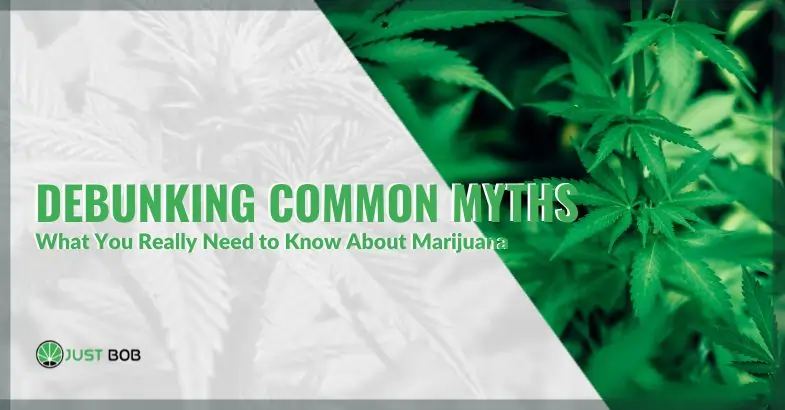Modified on: 16/03/2025
Unraveling the Smoke Screen: Separating Marijuana Fact from Fiction
Have you ever found yourself wondering about marijuana, navigating through a fog of information, some accurate, some not so much?
It’s a topic that’s been swirling in conversations for decades, often wrapped in layers of cultural assumptions and half-truths. As marijuana becomes more and more a part of mainstream discussion, it’s essential to take a step back and really examine what’s fact and what’s fiction. Think of it like sorting through a tangled garden – you need to carefully separate the weeds of misconception from the flowers of truth to truly understand what’s growing.
This journey of discovery isn’t about taking sides, but rather about shedding light on some of the most persistent myths that cloud our understanding. Here on Justbob we’re going to explore some of these curious claims, diving deep into the nuances of marijuana’s effects and characteristics.


Myth 1: Marijuana Zaps Your Motivation – Couch Lock or Creative Spark?
One of the most enduring images associated with marijuana is that of the perpetually unmotivated individual, glued to their couch, ambition seemingly evaporated into thin air. This stereotype, often dubbed “amotivational syndrome,” has permeated popular culture to such an extent that it’s become almost a caricature.
Movies and TV shows frequently depict marijuana users in this light, reinforcing the idea that it inherently leads to a lack of drive. But is this widely accepted depiction actually rooted in reality, or is it just another puff of smoke and mirrors?
To truly understand this, we need to delve into the complexities of motivation itself, exploring the myriad factors that influence our ambition and drive. Motivation isn’t a simple on-off switch; it’s a multifaceted phenomenon shaped by our personalities, our environments, and even our mental well-being. Could it be that the link between marijuana and motivation is more nuanced than we’ve been led to believe?
For years, the scientific community has been engaged in a lively debate about the true relationship between marijuana use and motivation.
While some studies suggest a potential for temporary lethargy or relaxation, particularly in certain individuals, it’s crucial to distinguish between a fleeting feeling and a permanent state of being. Recent studies say clearly that there is no amotivational syndrome linked to marijuana.
Motivation is a complex tapestry woven from numerous threads, including our innate personality traits, the social environments we navigate, and our underlying mental health conditions. Consider this: someone already struggling with feelings of depression or low motivation might turn to marijuana as a way to cope, seeking temporary relief or escape. In such cases, it could be easy to mistakenly attribute their lack of motivation solely to marijuana, when in fact, it might be a symptom of a deeper, pre-existing issue. This misattribution can inadvertently perpetuate the stereotype, obscuring the real cause and effect.
On the flip side, you might be surprised to learn that some individuals actually report feeling more focused or inspired when using marijuana, especially certain strains known for their uplifting properties. Imagine that – instead of couch lock, they experience a creative spark!
This wide range of experiences underscores a critical point: it’s far too simplistic to declare that marijuana universally diminishes motivation. The reality is a spectrum, as diverse and varied as the individuals themselves.
Myth 2: Relaxation Guaranteed? The Surprising Variability of Marijuana’s Effects
When you think of marijuana, what’s the first word that comes to mind?
For many, it’s “relaxation.” Marijuana has become almost synonymous with unwinding, a go-to substance for de-stressing after a long day or simply seeking a moment of calm.
Indeed, for countless individuals, this is precisely the experience. Certain strains of marijuana are even specifically cultivated and marketed to enhance these calming effects, promising a tranquil escape from the pressures of daily life. However, the seemingly straightforward idea that marijuana always equals relaxation is a bit like saying that coffee always makes you energized – while often true, it’s not the full story, is it? The truth is, the effects of marijuana are far more nuanced and varied than this simple equation suggests.
The experience of using marijuana is a highly individual affair, influenced by a fascinating interplay of factors. Strain type, for example, plays a significant role. Just as different types of apples have distinct flavors, different marijuana strains possess unique chemical profiles, leading to varied effects.
Then there’s THC content, the compound largely responsible for marijuana’s psychoactive effects. Higher THC levels can intensify these effects, but not always in a predictable way. Dosage is another crucial element – a small amount might induce gentle relaxation, while a larger dose could lead to entirely different outcomes.
And perhaps most importantly, individual physiology makes a world of difference. Just as people react differently to caffeine or alcohol, our unique bodies process marijuana in our own way.
For some, especially those who are new to marijuana or particularly sensitive to THC, the experience can be surprisingly different from the expected relaxation. Instead of calm, they might encounter anxiety, paranoia, or a general sense of unease. It’s like expecting a gentle breeze and getting caught in a sudden gust of wind!
And then CBD comes into the picture, adding another layer of complexity to the relaxation equation. Unlike THC, CBD is non-psychoactive, meaning it doesn’t produce the “high” typically associated with marijuana. Instead, it’s celebrated for its calming and anti-anxiety properties, which can provide a more grounded and soothing experience for many users.
CBD has a remarkable ability to interact with the body’s endocannabinoid system, a complex network of receptors responsible for maintaining balance across various physiological processes, including mood, stress response, and sleep regulation. By modulating this system, CBD can help promote a sense of relaxation without the unpredictable highs or potential anxiety that THC might induce.
Interestingly, CBD and THC can also work together in what’s often referred to as the “entourage effect”—a phenomenon where these compounds enhance each other’s therapeutic benefits.
This is why many individuals seeking relaxation turn to cannabis products with a higher CBD-to-THC ratio or even pure cannabidiol options, such as CBD oils, legal hash, or edibles. Provided, of course, that local legislation allows the consumption of CBD, which is by no means a given considering that cannabidiol still resides in a grey and not entirely defined legislative area in many European countries.
Myth 3: Memory Meltdown? Exploring the Real Impact of Marijuana on Your Mind
Another common concern swirling around marijuana is its potential impact on memory. The idea that marijuana use inevitably leads to memory loss is quite widespread, often portrayed in popular culture as an almost comical consequence.
This myth likely stems from the well-documented effects of THC on short-term memory. If you’ve ever been around someone who has recently used marijuana, you might have noticed them struggling to remember recent conversations or events. This temporary impairment of short-term memory is indeed a real phenomenon.
When under the influence of marijuana, it can become noticeably harder to retain new information or recall what just happened. It’s like trying to capture water in a sieve – the information slips through more easily than usual. However, it’s crucial to emphasize the word “temporary.” These memory impairments are generally transient, fading away as the effects of marijuana wear off.
But what about the long-term picture? Does occasional marijuana use today pave the way for significant memory problems down the road?
When we delve into the scientific research on long-term memory and marijuana use, a more nuanced and reassuring picture emerges.
For most individuals, occasional marijuana use does not appear to cause lasting damage to memory. It’s like enjoying a single scoop of ice cream – it’s a temporary indulgence, not a dietary overhaul. However, the story becomes more complex when we consider chronic, heavy use over extended periods, especially during adolescence.
Adolescence is a critical window for brain development, a time of rapid growth and the formation of crucial neural pathways. Frequent exposure to THC during this sensitive period could potentially interfere with these developmental processes. Think of it like trying to build a house during an earthquake – the foundations might be shakier, and the structure less stable.
Some studies suggest that heavy, long-term marijuana use starting in adolescence might be associated with more pronounced effects on memory and cognitive function later in life.
But what about adults?
For adult users, the picture is generally less concerning. Moderate consumption of marijuana is unlikely to result in significant long-term memory deficits for most people.
It’s important to remember that “heavy” and “moderate” are relative terms, and what constitutes each can vary. Moreover, individual vulnerability and genetic predispositions can also play a role. So, while the myth of inevitable memory meltdown is largely overstated, especially for occasional adult users, it’s wise to approach heavy, chronic use, particularly during adolescence, with caution and awareness.
Myth 4: Not Your Grandma’s Ganja: How Modern Marijuana Has Evolved
Have you ever heard someone say, “Marijuana is marijuana, it’s all the same”?
This is a common assumption, often rooted in nostalgia or a simple lack of awareness about how much things have changed. The idea that the marijuana consumed today is no different from what was around in the 1960s and 70s is a myth that persists, fueled by a perception of marijuana as a static substance, unchanging through time.
But the reality is far more dynamic.
To think of marijuana today as the same as it was decades ago is like thinking of modern smartphones as the same as rotary dial phones – technically, they both facilitate communication, but the similarities pretty much end there. Marijuana has undergone a dramatic transformation, evolving in potency, variety, and even the ways we consume it.
One of the most striking differences is the staggering increase in THC levels.
Back in the 1970s, the average THC content in marijuana hovered around a modest 1-3%. Fast forward to today, and some strains boast THC concentrations soaring above 25%, and even reaching 30% or higher! This isn’t just a slight increase; it’s a quantum leap in potency.
Modern marijuana is significantly more psychoactive than its predecessors, intensifying both the desired and undesired effects. It’s like turning up the volume knob on the experience – everything becomes amplified. This dramatic shift in potency has profound implications for users, especially those who might have preconceived notions based on past experiences with weaker marijuana.


Myth 5: Unlocking Your Inner Artist? The Elusive Link Between Marijuana and Creativity
The idea that marijuana acts as a magical key, unlocking hidden realms of creativity, has been romanticized for generations. Particularly within artistic and countercultural circles, stories abound of musicians, writers, and artists crediting marijuana for breakthroughs, inspiration, and a heightened sense of creative flow. This narrative has fueled a widespread belief that marijuana universally enhances creative thinking, acting as a catalyst for artistic expression.
But is this romantic notion a universal truth, or more of a captivating myth? Does marijuana truly turn everyone into a creative genius, or is the reality far more nuanced and individual?
The relationship between marijuana and creativity is anything but straightforward. It’s a complex interplay of individual responses, specific strains, and the very nature of creativity itself. Some studies suggest that marijuana can indeed encourage divergent thinking.
Divergent thinking is a cognitive process associated with generating new ideas, exploring multiple solutions to a problem, and thinking outside the box. It’s the kind of thinking that fuels brainstorming sessions and artistic innovation. This effect is often attributed to THC’s ability to alter perception and disrupt conventional thought patterns.
However, and this is a crucial however, these effects are not universal. Just as some people find coffee energizing while others find it jittery, individuals respond differently to marijuana’s influence on creativity. For some, marijuana might actually impair focus, making it harder to organize thoughts and see ideas through to completion. It’s like trying to paint a masterpiece in a room full of distractions – the initial inspiration might be there, but the focus needed to execute it might be elusive.
Others might experience a sense of apathy or mental fog, stifling creative output rather than enhancing it. Moreover, even if marijuana sparks initial inspiration or a rush of ideas, it doesn’t automatically translate into enhanced ability to refine or execute those ideas.
Creativity is a multifaceted process, encompassing not only the initial spark of inspiration but also the hard work of development, refinement, and execution. Marijuana might play a role in the initial spark for some, but it’s certainly not a guarantee of creative mastery for everyone.
Read also: 5 epic moments in the real cannabis history
Beyond the Myths: Embracing a Balanced and Informed View
Marijuana, as we’ve explored, is a substance that resists easy categorization. It’s not a simple yes or no, good or bad entity. Its effects are shaped by a complex web of factors, including our unique individual biology, the specific strain or product consumed, the dosage, the method of consumption, and the context in which it is used.
Myths about marijuana often arise from our human tendency to simplify complex phenomena, to create neat narratives where reality is often messy and nuanced. These myths, while sometimes entertaining or convenient, can obscure the real picture, hindering informed discussions and balanced perspectives.
However, as our scientific understanding of marijuana deepens through ongoing research, and as societal conversations evolve, it becomes increasingly clear that no single, simplistic narrative can capture the full story. The truth about marijuana is multifaceted, diverse, and often surprising.
Marijuana Myths: takeaways
- Many popular beliefs about marijuana are rooted in stereotypes rather than scientific understanding. From the idea that it universally kills motivation to the notion that it always induces relaxation, these myths often oversimplify the complex reality of marijuana’s effects. Understanding the nuances—like strain variation, individual biology, and context of use—is crucial for a balanced perspective. It’s time to move beyond simplistic narratives and embrace a more informed view of this widely discussed substance, recognizing that experiences are diverse and generalizations are often misleading.
- The potency and forms of marijuana today are vastly different from those of past decades. The dramatic increase in THC levels and the emergence of new consumption methods like edibles and concentrates significantly alter the experience and potential effects. This evolution means that past assumptions or experiences with marijuana may not be relevant today. Staying informed about these changes is essential for anyone interested in understanding contemporary marijuana and its impact, moving away from outdated perceptions and acknowledging the current landscape.
- Individual responses to marijuana are incredibly varied and depend on numerous factors, including genetics, frequency of use, and mental state. Claims that marijuana universally enhances creativity or causes memory loss are misleading. The effects are highly personal and context-dependent, highlighting the need for nuanced discussions rather than broad generalizations. Adopting a balanced and open-minded approach allows for a more accurate understanding of marijuana, respecting the complexity of its interactions with different individuals and situations.
Marijuana Myths: FAQ
Is it true that marijuana makes everyone unmotivated?
This is a common stereotype, but it’s not universally true. While some people might experience temporary lethargy, motivation is complex and influenced by many things beyond marijuana use, like personality and mental health. Some even find it helpful for focus. It’s an oversimplification to say it always reduces motivation. Think of motivation as a personal engine – marijuana might act as a temporary gear shift for some, but it doesn’t fundamentally break the engine for everyone. Individual experiences vary widely, and attributing a lack of motivation solely to marijuana overlooks other significant factors at play.
Is today’s marijuana stronger than it used to be?
Absolutely. THC levels have significantly increased over the decades. Marijuana today can be much more potent than what was available in the past. This higher potency can intensify effects, both good and bad, and it’s important to be aware of this difference, especially for those who haven’t used marijuana in a long time or are new to it. Imagine comparing a cup of mild tea to a shot of espresso – both contain caffeine, but their intensity is vastly different. Similarly, modern marijuana packs a much stronger punch, requiring users to be more mindful of dosage and potential effects.
Can marijuana improve creativity?
It’s a popular idea, but not a universal effect. For some, it might encourage different thinking and spark new ideas. However, it can also hinder focus for others. Creativity is complex, and marijuana’s impact varies greatly from person to person. It’s not a guaranteed creativity booster for everyone. Think of marijuana as a potential muse – sometimes inspiring and helpful, other times distracting or unhelpful. Creativity is a multifaceted skill that requires focus and discipline, and while marijuana might spark initial ideas for some, it’s not a magic wand that automatically unlocks artistic genius in everyone.









